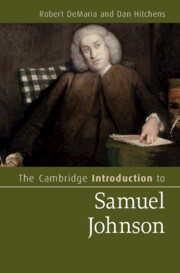Book contents
- The Cambridge Introduction to Samuel Johnson
- The Cambridge Introduction to Samuel Johnson
- Copyright page
- Dedication
- Contents
- Figures
- Acknowledgements
- Chronology
- Abbreviations
- Chapter 1 Life and Times
- Chapter 2 Journalist
- Chapter 3 Poet and Storyteller
- Chapter 4 Scholar
- Chapter 5 Critic
- Chapter 6 Social and Political Thinker
- Chapter 7 Biographer
- Chapter 8 Legend
- Notes
- Further Reading
- Index
- Cambridge Introductions to Literature
Chapter 6 - Social and Political Thinker
Published online by Cambridge University Press: 07 February 2025
- The Cambridge Introduction to Samuel Johnson
- The Cambridge Introduction to Samuel Johnson
- Copyright page
- Dedication
- Contents
- Figures
- Acknowledgements
- Chronology
- Abbreviations
- Chapter 1 Life and Times
- Chapter 2 Journalist
- Chapter 3 Poet and Storyteller
- Chapter 4 Scholar
- Chapter 5 Critic
- Chapter 6 Social and Political Thinker
- Chapter 7 Biographer
- Chapter 8 Legend
- Notes
- Further Reading
- Index
- Cambridge Introductions to Literature
Summary
Johnson’s political views were complex, partly because they were based on a deeper philosophy of the individual and society. Placed here by divine providence, each person has something to do for the good of others; and legislators, too, can play their part in preserving human relationships from individual malice. Crucially, governments must also keep order, and ward off the possibility of social breakdown – the Civil War was within living memory when Johnson was growing up. Thus he praised hierarchy and state-enforced religious unity, inasmuch as it mean harmony and security. Johnson’s political writings are often combative and bluntly phrased: in his early work as an Opposition journalist, outraged at censorship and creeping tyranny; in his fierce critiques of imperial exploitation and slavery; and in his contempt for the radicals who appealed to ‘liberty’ – a slogan Johnson regarded with some suspicion. In his journey to the Scottish Highlands, meanwhile, Johnson praised traditional authority while showing no nostalgia for feudalism.
- Type
- Chapter
- Information
- The Cambridge Introduction to Samuel Johnson , pp. 96 - 113Publisher: Cambridge University PressPrint publication year: 2025

